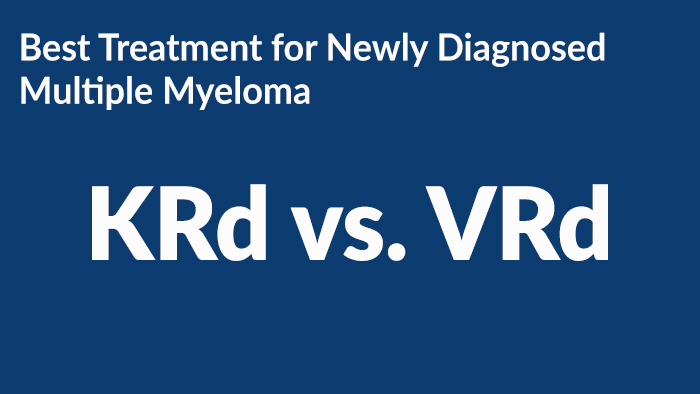A recent article published in JAMA Oncology1 questions whether VRd should remain as the standard of care (SOC) in newly diagnosed multiple myeloma. Careful analysis of the ENDURANCE (E1A11) phase III trial2 raises the question whether VRd continues to be the SOC for standard to intermediate-risk NDMM.
The authors conclusions that regimens are equally effective for treatment of NDMM, patients with risk factors or the presence of peripheral neuropathy should be considered for KRd, whereas patients with cardiopulmonary risk factors or disease should be considered for VRd are based upon a number of published studies.2-7
The bulk of their arguement is based upon an analysis of the ENDURANCE (E1A11) phase III trial.2 They call into question 4 key factors:
- The trial excluded patients with high-risk features. This is important because subsequent published retrospective and observational studies have shown that with carfilzomib-based combination therapy results in equally good outcomes (complete response, PFS) in standard and HR NDMM,2,4 and carfilzomib may have the potential to mitigate adverse prognosis in HR MM.
- This study specifically enrolled patients with no immediate intent for transplant despite upfront ASCT still being considered SOC for NDMM.
- Third, there were some noticeable differences in the toxic effect profile of both regimens. Since early discontiuation can introduce bias as it relates to comparing the PFS. The authors alos suggest that in the community oncology setting, bortezomib is often used once weekly, owing to the lower incidence of peripheral neuropathy, rather than twice weekly.
- Fourth, although cross-trial comparisons have limitations, differences were seen in the efficacy of both arms compared with previously published data without a tangible explanation.
You can read the full article here.
References:
- Hashmi H, Shah Z, Anwer F. Carfilzomib-Based 3-Drug Regimens for Newly Diagnosed Multiple Myeloma—All That Glitters Is Not Gold. JAMA Oncol. Published online April 01, 2021. doi:10.1001/jamaoncol.2021.0174
- Kumar S, Jacobus SJ, Cohen AD, Weiss M, Callander NS, Singh AA, et al. Carfilzomib, lenalidomide, and dexamethasone (KRd) versus bortezomib, lenalidomide, and dexamethasone (VRd) for initial therapy of newly diagnosed multiple myeloma (NDMM): results of ENDURANCE (E1A11) phase III trial. J Clin Oncol. 2020;38(suppl 18):LBA3-LBA. doi:10.1200/JCO.2020.38.18_suppl.LBA3
- Durie BGM, Hoering A, Abidi MH, et al. Bortezomib with lenalidomide and dexamethasone versus lenalidomide and dexamethasone alone in patients with newly diagnosed myeloma without intent for immediate autologous stem-cell transplant (SWOG S0777): a randomised, open-label, phase 3 trial. Lancet. 2017;389(10068):519-527. doi:10.1016/S0140-6736(16)31594
- Korde N, Roschewski M, Zingone A, et al. Treatment with carfilzomib-lenalidomide-dexamethasone with lenalidomide extension in patients with smoldering or newly diagnosed multiple myeloma. JAMA Oncol. 2015;1(6):746-754. doi:10.1001/jamaoncol.2015.2010
- Dimopoulos MA, Moreau P, Palumbo A, et al; ENDEAVOR Investigators. Carfilzomib and dexamethasone versus bortezomib and dexamethasone for patients with relapsed or refractory multiple myeloma (ENDEAVOR): a randomised, phase 3, open-label, multicentre study. Lancet Oncol. 2016;17(1):27-38. doi:10.1016/S1470-2045(15)00464-7
- Mushtaq A, Kapoor V, Latif A, et al. Efficacy and toxicity profile of carfilzomib based regimens for treatment of multiple myeloma: a systematic review. Crit Rev Oncol Hematol. 2018;125:1-11. doi:10.1016/j.critrevonc.2018.02.008
- Facon T, Lee JH, Moreau P, et al. Carfilzomib or bortezomib with melphalan-prednisone for transplant-ineligible patients with newly diagnosed multiple myeloma. Blood. 2019;133(18):1953-1963. doi:10.1182/blood-2018-09-874396

